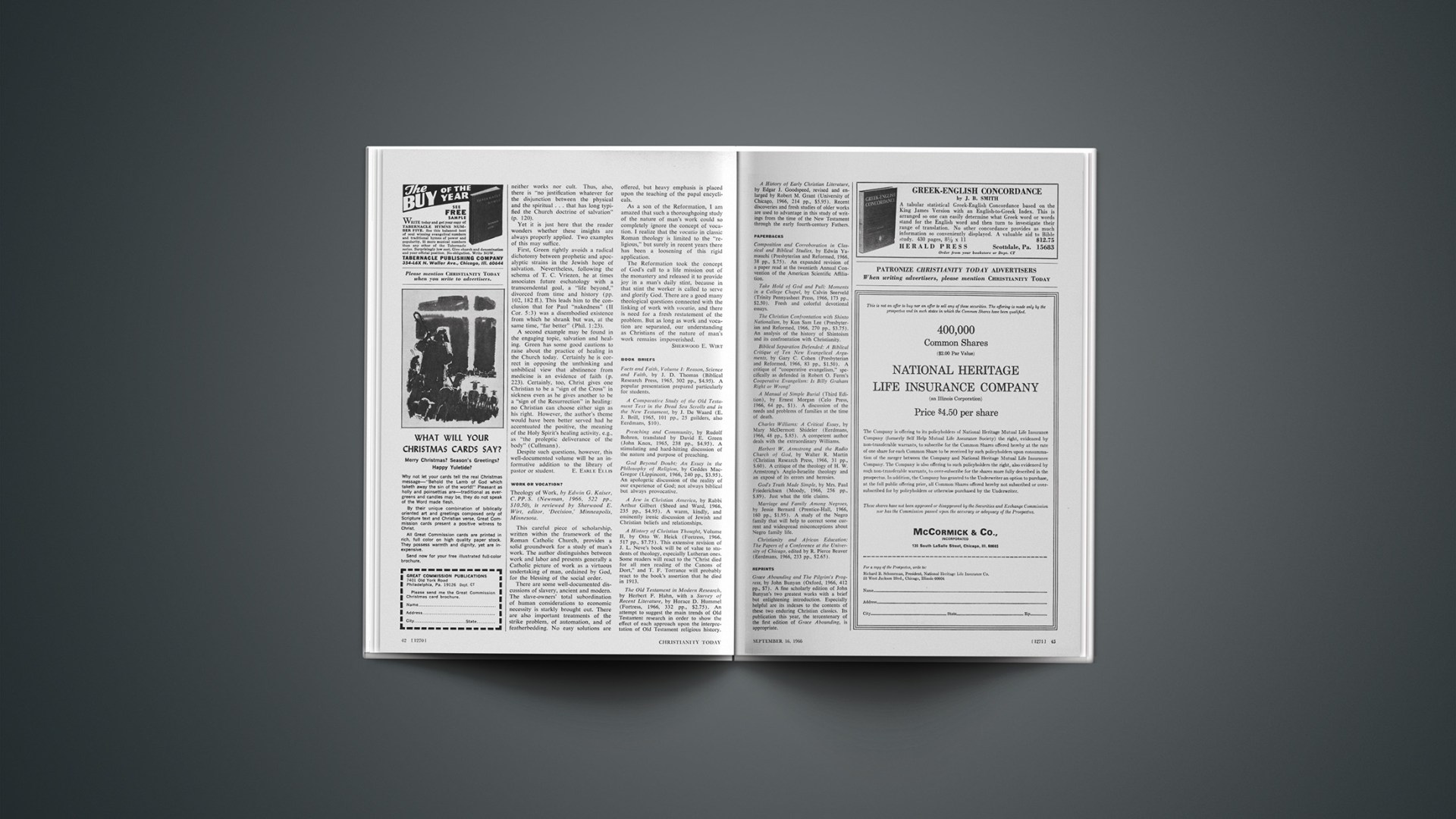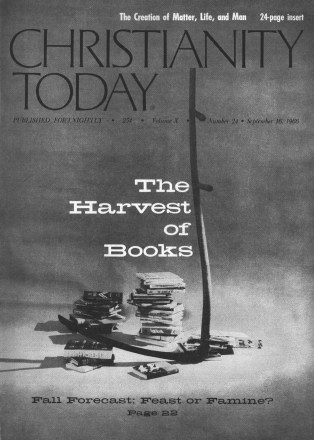By faith Abraham obeyed when he was called to go … not knowing where he was to go.
Hebrews 11:8
With test tube in hand, man has solved many big problems. But in the course of laboratory discovery he has also created vast new dilemmas, and the future is as uncertain as ever. Says geneticist V. Elving Anderson, “I doubt that our prospect is really different from that faced by Abraham.”
Anderson is one of a disturbingly few among U. S. scienists who take their Christian commitment seriously enough to grapple with the moral, ethical, and theological consequences of today’s proliferating developments in biology, chemistry, electronics, and technology. His platform last month was a joint meeting of the Evangelical Theological Society and the American Scientific Affiliation on the Chicago campus of North Park College. These two groups are trying to take the lead in meshing the insights of varying disciplines to point the way toward responsible Christian answers for the big new problems.
Increasingly, men of science are being required to make decisions bearing on life and death. Some months ago NBC-TV carried a documentary on a machine which spells life for people suffering from otherwise incurable kidney conditions. The problem is that there are more people who need the machine than can be handled, so an advisory board (including a Protestant minister) determines which applicants will be given treatment and, in effect, which must be left to die.
“We have thought that science would solve all our problems,” says Anderson, “only to find that new questions arise. Those scientists who worked so effectively in the first part of this century to develop means of disease and death control were not fully aware that their success would create the problem of birth control for our generation.”
The issue that looms perhaps even larger than birth control is genetic control. Life magazine, which popularized the problem, went so far as to ask, “Which men will we assign to play God?”
In the mind of Anderson, who is assistant director of the Dight Institute for Human Genetics at the University of Minnesota, the question is not whether or not we should control our genetic future, but “whether this control should be indirect and unplanned, or the result of conscious choice.”
Anderson’s speech before the joint ASA-ETS meeting explained the recent big development in genetics, the apparent “cracking” of the genetic code, and listed some of the beneficial effects for mankind in the future, particularly in curbing of offsetting mental retardation. Anderson avoided discussion of the more bizarre prospects with which Life dealt.1Life cites the speculations of a prominent biologist that “only 10 or 15 years hence, it could be possible for a housewife to walk into a new kind of commissary, look down a row of packets not unlike flower-seed packages, and pick her baby by label.”
In drawing up programs for genetic control Anderson urges that the criteria should include a candid sense of responsibility among the scientists, a freedom of choice for the individuals involved, and “adequate” views of man and the future. For him the latter involves bringing the Christian perspective into play.
Following Anderson’s presentation was a discussion of its implications by a panel consisting of a clinical psychologist, a sociologist, a philosopher, and a theologian. The five-man joint meeting also focused on current theories on the origin of man with a presentation by scholar James O. Buswell III of St. Louis, and a report from Calvin College’s Donald Wilson, who has been conducting research in East Africa this summer under a National Science Foundation grant at the request of famed archaeologist Louis S. B. Leakey.
This year the ASA is marking its twenty-fifth birthday and now boasts a membership of more than 1,500 scientists. With its steady growth, however, it has lost members from each end of the theological spectrum.
Miscellany
Roman Catholic churches that want to join traditionally Protestant-Orthodox councils have gotten guidelines from the National Council of Churches and the Catholic bishops’ ecumenical commission. A year or two of cooperation is suggested “outside the structure of any existing organization until the wisdom of closer ties is indicated.…” Some Catholic parishes already belong to councils, but the only council-aligned diocese so far is the one serving Santa Fe, New Mexico.
National Cathedral (Episcopal) in Washington, D. C., drew 25,000 people to sixteen nights of free summer cultural events outdoors on the cathedral grounds. Believed to be the most lavish free series on religious arts ever seen in America, it included the Congolese Missa Luba and other masses and liturgical music, a cycle of medieval plays, and Menotti’s ballet The Unicorn, the Gorgon, and the Manticore.
Two Roman Catholic bishops in Argentina criticized the military regime that seized power June 28. An episcopal letter said “this Government has no claim on the faithful, nor can the church depend on it.”
Patriarch Kyrillos VI of the Coptic Orthodox Church of Egypt said his institute is training nationals to replace “foreign, politically aligned” missionaries in Africa.
Construction began on a $1 million Presbyterian Historical Society museum in Philadelphia, located three blocks from Independence Hall.
Church World Service “reluctantly” quit welfare for the needy in Nigeria because the government failed to provide tariff-free import and means of distribution.
As successor to sit-ins and teach-ins, Chinese For Christ Inc. sponsored a “Christ-In” in downtown Los Angeles—a march of 200 international students to show “God is not dead.”
California’s retiring Bishop James A. Pike will teach part-time at the University of California Law School along with previously announced work at the Center for the Study of Democratic Institutions.
The National Catholic Reporter, newsy independent weekly, named Lutheran Martin E. Marty of the Christian Century to its board.
At noon on August 24, workers at the $150,000 chapel for the Atlanta Area Methodist Church heard something snap. Nine hours later the 120-ton structure tumbled down through two underground parking decks with a crash heard throughout the downtown area. No one was injured.
Former Congressman Walter Judd is honorary chairman of the Paul Carlson Foundation, named for the medical missionary slain in the Congo in 1964, which plans rehabilitation and medical services in that nation.
Gideons International plans to distribute five million Bibles for the first time in 1966–67, members were told at their annual convention.
The National Council of Churches’ Mississippi Delta Ministry was given $11,150 by the Netherlands Reformed Church.
Personalia
Lars Granberg, acting vice president of Hope College, is the new president of Northwestern College, Orange City, Iowa. Both are Reformed Church schools.
Keith A. Bell, dean of students at Malone College, moves to the same post at Seattle Pacific College.
Charles E. Cobb, minister of St. John’s Congregational Church, New York City, was appointed executive coordinator of the Committee for Racial Justice Now, United Church of Christ.
Andrew E. Newcomer, United Presbyterian evangelism director for fifteen Midwestern states, was elected to the long-vacant post of vice-president at Louisville Presbyterian Theological Seminary.
The Rev. Joseph S. Willis, a United Presbyterian, will teach Protestant theology at the University of Albuquerque, a Roman Catholic school.
Henry B. Clark II, director of urban affairs for the National Council of Churches, becomes a religion professor at Duke University next year.
On Campus
A new Methodist college opens this month in Norfolk, Virginia. The coeducational liberal arts school, to be known as Virginia Wesleyan College, is beginning operation with a small class of freshmen. An eventual enrollment of 1,200 is expected.
Dedication services were held Labor Day at Lucerne (California) Hotel, formerly a plush gambling casino and now the property of San Francisco Baptist Seminary. The small fundamentalist school purchased the 140-room hotel with a seven-acre tract of land for $125,000. Present plans call for using the property as a spiritual retreat and conference grounds. Seminary classes will continue to meet in a San Francisco church.
The Iowa Synod of the United Presbyterian Church is severing all ties with Parsons College. A resolution adopted by the synod charges that the college “has chosen to take a direction not compatible with the Church’s concept of higher education in a church-related context.”
Next January 5, the Rev. Amos B. Barton will be inaugurated president of Judson College, an American Baptist school in Elgin, Illinois. Barton will succeed Benjamin P. Browne, who will assume a newly created post of chancellor.
Ground was broken on a 562-acre tract which will be the campus for the proposed new Atlanta Baptist College. It is located some twelve miles from downtown Atlanta. A 2.2-million-dollar building program has been launched. Officials hope to enroll a freshman class possibly as early as next September.










